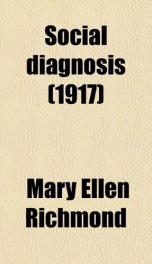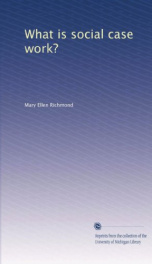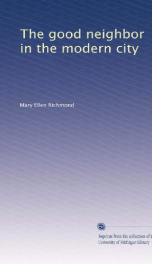social diagnosis

Purchase of this book includes free trial access to www.million-books.com where you can read more than a million books for free. This is an OCR edition with typos. Excerpt from book: CHAPTER III DEFINITIONS BEARING UPON EVIDENCE THE first interview with one needing treatment, the early contacts with his immediate family, the consultations with those outside his family who may give insight or co-operation, the examination of any documents bearing upon his problem, the later correlation of these separate itemsall these processes of social case work are steps in what we hope will be a helpful course of action. They lead up through social diagnosis to a plan of treatment. The relation of diagnosis to this practical end cannot be too much insisted upon. Before turning to the discussion of this relation in present-day case work practice, however, it is necessary, even at the risk of some repetition, to prepare the way for the more concrete material which is to follow by giving at this point a few formal definitions. I. CERTAIN TERMS FREQUENTLY USED 1. Diagnosis. The use of the word diagnosis is not restricted to medical case work; it means in zoology and botany, for example, "a brief, precise, and exclusively pertinent definition." In social diagnosis there is the attempt to arrive at as exact a definition as. possible of the social situation and personality of a given client.1 Investigation, or the gathering of evidence, begins the process, the critical examination and comparison of evidence follow, and last come its interpretation and the definition of the social difficulty. I n common use, case workers often call all of this " an investigation," but, as their besetting sin is to slur over the processes of comparison and interpretation and to overemphasize the gathering of items of evidence, there is an educational advantage in using for the whole process the word which describes more especially the end of the process. Investigation enters into diagnosi...
Info about the book
Author:
Series:
Unknown
ISBN:
0789008718
Rating:
4/5 (1)Your rating:
0/5
Languge:
English
Users who have this book
Users who want this book
What readers are saying
What do you think? Write your own comment on this book!
write a commentif you like social diagnosis try:
Other books by this author
Do you want to exchange books? It’s EASY!
Get registered and find other users who want to give their favourite books to good hands!





